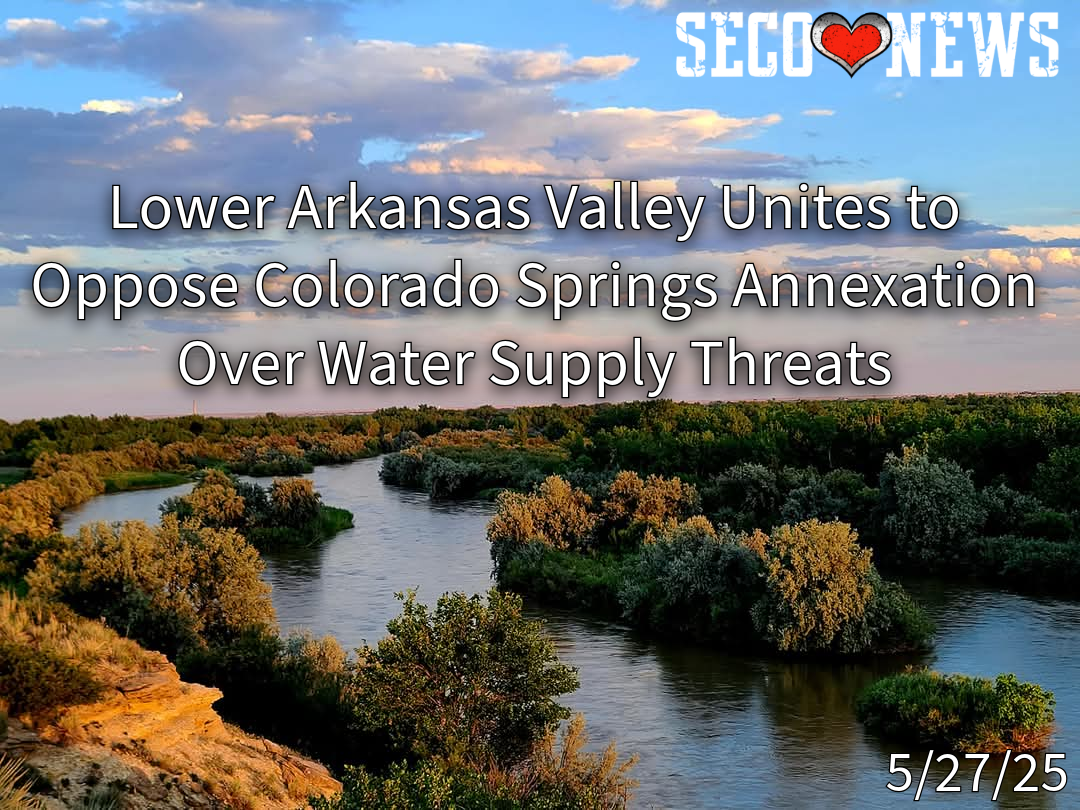Lower Arkansas Valley Unites to Oppose Colorado Springs Annexation Over Water Supply Threats

Description: The Lower Arkansas Valley Water Conservancy District Released the Following Statement on May 27, 2025...

Lower Arkansas Valley Communities Unite Against Colorado Springs Annexations
(ROCKY FORD, CO – May 27, 2025) – Communities throughout the Lower Arkansas Valley are uniting in opposition to new annexations by the City of Colorado Springs that would exacerbate the city’s already projected 34,000 acre-feet annual water supply gap to support build out of land already within its city limits. New annexations, such as for the proposed Karman Line development, would only add to this shortfall – raising alarm about potential long-term consequences to southeastern Colorado’s agricultural lands, rural economies, water quality, ecosystems, and cultural heritage.
In February, the Board of Directors of the Lower Arkansas Valley Water Conservancy District passed a resolution expressing concern that much of the water to meet Colorado Springs’ growing demands would likely come from farms in the Lower Arkansas Valley. Since then, the following local governments and organizations have passed similar resolutions (attached):
● Otero County Board of County Commissioners
● Prowers County Board of County Commissioners
● Crowley County Board of County Commissioners
● City of La Junta City Council
● Town of Ordway Board of Trustees
● Otero County Farm Bureau
These resolutions reflect a shared concern that continued water transfers to fuel Colorado Springs’ rapid growth has the potential to cause lasting harm to rural southeastern Colorado.
The issue comes to a head as Colorado Springs prepares for a special election on June 17 where voters will decide the fate of the Karman Line annexation – a proposed 1,900-acre development that would include 6,500 homes and commercial space, located approximately 3.5 miles outside current city limits. The development is projected to require 1,700 acre-feet of water per year, adding to the city’s already unmet future need of 34,000 acre-feet annually for planned growth within existing city limits.
The annexation has drawn criticism not only for its water implications, but also for its use of a controversial “flagpole annexation” method – where distant parcels are connected to the city through a long, thin strip of land, enabling non-contiguous development.
Originally approved by Colorado Springs City Council on a 7-2 vote on January 28, 2025, the Karman Line annexation was challenged by a citizen-led referendum that gathered more than 31,000 signatures, forcing the Council to reconsider. On April 8, the Council voted to refer the issue to their voters, rather than repeal the ordinance to de-annex the property.
This follows the Council’s August 2024 rejection of the Amara Development, a 3,200-acre flagpole annexation that would have required 3,500 acre-feet of water annually. That proposal was voted down by a narrow 5–4 margin following intense public opposition.
Residents and stakeholders continue to raise concerns about the cumulative effects of these types of annexations, citing the increased strain on public services, infrastructure, and the added demand for water resources – a demand that places further pressure on already stressed agricultural lands and rural communities in the Lower Arkansas Valley.
"We recognize that Colorado Springs is growing, and we’re not here to stand in the way of progress," said Rob Oquist, Otero County Commissioner. "But growth must be balanced with long-term water planning. Voters in Colorado Springs have a real opportunity to consider how decisions made today will affect not just their own community, but rural areas like ours that are part of the same watershed. We’re asking for thoughtful, responsible growth that doesn’t come at the expense of agricultural regions downstream."
"What we are asking the Colorado Springs City Council and their voters to consider is this: Securing 34,000 acre-feet of additional water is already a significant burden that your Utility bears just to support buildout of the tens of thousands of undeveloped acres already within your city limits.” said Jack Goble, General Manager of the Lower Arkansas Valley Water Conservancy District. “Every decision that increases this demand puts even more farmland – and the rural communities that depend on it to survive – at risk. We urge you to choose a path that protects the water future of both your community and ours.”
About the Lower Arkansas Valley Water Conservancy District:
Since 2002, the Lower Arkansas Valley Water Conservancy District has served Pueblo, Crowley, Bent, Otero, and Prowers counties with a focus to safeguard water resources in the Lower Arkansas Valley today and for future generations. www.lowerark.com
Follow SECO News on Facebook.
Subscribe to the SECO News YouTube Channel.
Press releases Sponsor




.png)


.png)




.png)



.png)


.png)







